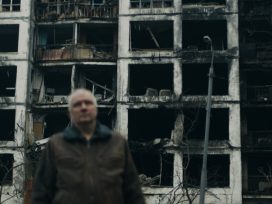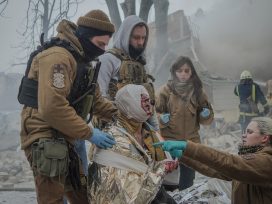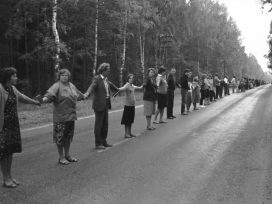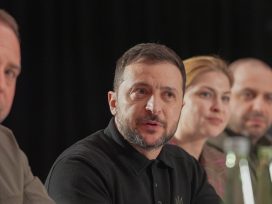The justice train from Bucha
The egregious crimes against Ukraine’s civilian population might just be too much for the International Criminal Court to handle. Not only does it lack resources but it also doesn’t have jurisdiction over the crime of aggression – in part due to the position of its most influential member states and the Trump administration’s staunch opposition.
Mass graves, raping, torture; executions of civilians; the shelling of residential areas and shelters: more and more evidence is surfacing about the brutality of the Russian attacks on civilians in Ukraine.
The recent bombardment of Kramatorsk railway station with Tochka-U tactical missiles was a symbolic case of such unlawful deliberate attacks on passenger infrastructure and residents, murdering at least 50 people (including five children), and seriously wounding around 100 persons. One missile was addressed as a revenge ‘for our children’, parroting Russian military propaganda, and in a bitter twist, offering a painful symbol of the offensive’s disregard for real-life children.
Trying the butchers of Bucha
The news of this bombardment followed the nightmarish images of the massacres in the city of Bucha. Charred corpses; bared and battered female bodies in blankets left on the streets; men with their hands tied behind their back and shot in the head; a mass grave about 14 meters long in a churchyard and more horrific sights haunted the viewers. Fears are growing that Izyum might turn out to offer horrors similar to those of Bucha. Satellite images show mass graves in the areas surrounding the besieged city of Mariupol, merely signalling the brutality of the attacks. Ukrainian officials even allege that bodies of murdered civilians and fallen Russian soldiers are being cremated – recalling the darkest moments of the 20th century.
Ukrainian victims of war now need, more than ever, a train of justice directly from Bucha to The Hague, where those responsible for these crimes should be brought to justice – sooner or later.
Meanwhile, investigations into war crimes, crimes against humanity and even the crime of all crimes, genocide, are diligently being pursued by the prosecutor general of Ukraine, the latest Prosecutor of the International Criminal Court Karim Khan and other national authorities and international organisations. On 25 April 2022, the ICC Office of the Prosecutor announced that the ‘Office has become a participant in the joint investigation team (JIT) on alleged core international crimes committed in Ukraine, joining existing members Lithuania, Poland and Ukraine’.

A double decker train in the fog of the Hague Central Station. Photo by Steven Lek via Wikimedia Commons.
Soft on crime against humanity
This is not only because tf the ever-growing public outcry over the horrific crimes of the war in Ukraine, but also because the ‘situation’ of Ukraine (as per the international criminal law nomenclature) has already been referred for investigation to the Prosecutor of the International Criminal Court, Karim Khan by 41 state-parties to the Rome Statute of the International Criminal Court (including Greece and Cyprus).
Running on a parallel track, dozens of renowned academics, including Philip Leech, Dapo Akande and Philippe Sands, along with renowned politicians, such as former UK PM Gordon Brown and John Major, signed a declaration in March 2022, calling for the establishment of a special international criminal tribunal to investigate heinous war crimes in Ukraine, including the crime of aggression itself.
This is initiated because although the act of military aggression has been recognised as an international crime by the Rome Statute of the International Criminal Court, yet its jurisdiction to try the offenders of this charge is still extremely limited.
Most member states of the Rome Statute of the International Criminal Court strongly opposed widening this jurisdiction in Kampala in 2010 as well as in New York in 2017.1 This legal problem could arguably be solved through the establishment of a new Special International Criminal Tribunal for the crimes of the invasion of Ukraine.
The future is uncertain, as signified by the European Union which appears to proactively amass protective gear and potassium iodide pills (KI) in order to be ready for the ‘worst-case scenario’, namely a nuclear bombing. Admittedly, the war creates volatility on many further levels of international relations.
Financing justice
But if our world continues to exist, those responsible for the war crimes in Ukraine will have to be eventually held accountable not only by the national courts of Ukraine, Germany, Poland, Lithuania, Switzerland, Sweden and possibly other countries, but predominantly by the judicial institutions in The Hague: the International Criminal Court, and possibly a new special international criminal tribunal. Maybe both? The venues may be less important than the cause, but there are good and largely practical reasons to believe that a new institution will be dedicated to this.
While quite a few cogently believe that a new special international criminal tribunal would ‘encroach’ on the part of the jurisdiction of the International Criminal Court, it is indisputable that a new institution could potentially raise more fiscal and human resources and overall functional support. It could also get powerful states on board which are not yet parties to the International Criminal Court, including the United States of America.
The current ICC prosecutor Karim Khan QC has been candid about the fact that the ICC is overwhelmed. Khan noted on 28 February that he would ‘be asking for the support of all State Parties and the international community as a whole as my Office sets about its investigations. I will be calling for additional budgetary support, for voluntary contributions to support all our situations, and for the loan of gratis personnel. The importance and urgency of our mission is too serious to be held hostage to lack of means.’
Fraught relations
As far as the other central question, namely why countries like the United States of America are not yet parties to the Rome Statute, most experts would easily acknowledge that it is a thorny issue. Put short, one could answer that were the US to accept the International Criminal court’s jurisdiction, that would ultimately lead to Americans being prosecuted by the court sooner or later.
There are, of course, other reasons, most eloquently analysed by John Bolton in his historical speech ‘Protecting American Constitutionalism and Sovereignty from International Threats’, which he presented at the Federalist Society in 2018, just one day before the 11/09 anniversary.2
Bolton’s speech eventually led to Donald Trump’s Executive Order No. 13928, which authorised sanctions on International Criminal Court officials. A few months later, the US Secretary of State Mike Pompeo imposed sanctions and refused visas for the outgoing prosecutor, Fatou Bensouda, after she launched an investigation into alleged war crimes committed by US military personnel in Afghanistan, amplifying the view that Washington would not allow Americans to be threatened by ‘a kangaroo court’. The sanctions also targeted a senior staff member of her office, Phakiso Mochochoko, and contained visa restrictions on certain ICC personnel. Fortunately, Joe Biden revoked all these sanctions in April 2021.
Hence, the establishment of a new special criminal tribunal, similar to those in Nuremberg and Tokyo after the end of WWII, becomes more and more practically plausible. The protracted history of relations between the US and ICC point in this direction, as the ICC already struggles against lack of resources. Besides Ukraine is clearly in favour of establishing a new special tribunal for the prosecution of the crime of aggression, and possibly other crimes committed during the latest invasion.
Uncertain timeline
No one can really know for certain when the first trials will commence. However, given the swift reaction of the ICC Prosecutor, one could anticipate that lower-ranking officials might be tried within 2-3 years or even quicker, while up to a decade might be needed before higher officials face trial, since trials in absentia are not compatible with the established international criminal law principles. Admittedly, since trials of such heinous crimes can take place only if the accused persons are present at the courtroom, their arrest or surrender will be of critical importance. Understandably this will be a crucial threshold for the actual commencement of the trials and the eventual conferment of justice.
So what will happen in the end in the field of international criminal law after the end of the war in Ukraine? The train of justice will reach The Hague’s central railway station and the truth will shine for centuries to come. The final question is whether these serious legal consequences will be strong enough to deter future aggressors from committing similar crimes again.
This essay is based on the author’s article published in Voria.gr in April 2022.
General Assemblies of the state-parties to the Rome Statute of the International Criminal Court in Kampala in 2010 and New York in 2017. See also Tsilonis, V.,, ‘The Crime of Aggression: The Birth of a Crime.’ in: The Jurisdiction of the International Criminal Court. Springer, Cham, 2019, pp. 149-166. https://doi.org/10.1007/978-3-030-21526-2_6
An in-depth critical analysis of John Bolton’s speech can be found in a Greek article and a subsequent co-authored academic paper: Victor Tsilonis and Eirini-Nikoleta Favgi, ‘The Historical Speech of John Bolton against the International Criminal Court’ in Essays in Honour of Professor Giannis Panousis. Sideris, Athens, 2020, pp. 533-544
Published 6 May 2022
Original in English
First published by Voria.gr (in Greek), Eurozine (amnded, in English)
© Victor Tsilonis / Voria.gr / Eurozine
PDF/PRINTPublished in
In collaboration with
In focal points
Newsletter
Subscribe to know what’s worth thinking about.
Related Articles

Ukraine faces its greatest diplomatic challenge yet, as the Trump administration succumbs to disinformation and blames them for the Russian aggression. How can they navigate the storm?

Mineral rush
Topical: Critical raw materials
Why does peace in Ukraine hang on a ‘mineral deal’ whose handling is more reminiscent of trade than negotiations? Perhaps because the global race for critical raw material mining is well and truly underway, digging for today’s equivalent of gold: raw earth elements and lithium critical for renewables and digital technology but also modern weaponry.






